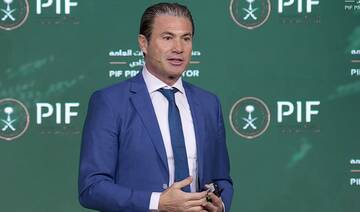RIYADH: Over 100 speakers from more than 600 organizations will convene at the Retail Leaders Circle Global Forum 2025 in Saudi Arabia to discuss collaboration amid digital innovation and economic reforms.
The two-day event, taking place from Feb. 4-5 at the Fairmont Hotel in Riyadh, will bring together industry executives, policymakers, and investors to explore strategies for navigating a rapidly changing retail landscape.
Themed “Rebuilding a Shared Future,” the event aims to address how the sector can rebuild trust and cooperation while adapting to digital transformation, shifting consumer behaviors, and new regulatory frameworks.
This year’s forum comes as Saudi Arabia’s retail sector continues to show strong resilience and sustained growth, with total sales reaching SR37.4 billion ($9.97 billion) in the third quarter of 2024, despite ongoing global economic uncertainties.
Retail sales in the Kingdom are forecast to reach $161.4 billion by 2028, according to data platform Statista, while the e-commerce sector is projected to surpass $13.2 billion by 2025.
“Saudi Arabia’s Vision 2030 is really shaking up the retail sector, and we’re seeing exciting changes across the board,” said Panos Linardos, chairman of the RLC Global Forum, in an interview with Arab News.
He pointed out that retail is a key pillar of the Kingdom’s diversification efforts, and “it’s evolving rapidly with digital transformation, regulatory changes, and shifting consumer expectations.”
Linardos added: “There’s a lot of opportunity ahead, but also some challenges that need to be tackled to fully unlock the sector’s potential. That’s where the RLC Global Forum comes in.”
RLC is an invitation-only platform that brings together industry leaders, policymakers, and innovators to discuss key issues shaping the retail sector.
Some of the partners involved include Diriyah Co., Apparel Group, and Cenomi Centers, the largest owner, operator, and developer of contemporary lifestyle centers in Saudi Arabia.
Chalhoub Group, and Panda Retail Co. are also set to attend.

Panos Linardos, chairman of the RLC Global Forum. Supplied
The event provides data-driven research, thought leadership, and best practice sharing, in line with Saudi Arabia’s Vision 2030, which seeks to diversify the economy and position the Kingdom as a global retail and business hub.
“Retailers in Saudi Arabia face several challenges, such as competition from cross-border e-commerce, changing consumer expectations, and regulatory complexities,” Linardo said.
To stay competitive, he added that retailers need to “embrace digital transformation, adopt omnichannel strategies, and use data to better understand and serve their customers.”
The Kingdom’s retail sector is experiencing significant growth and investment opportunities, driven by Vision 2030 and the accelerated digital transformation.
The demand for seamless shopping experiences and experiential retail concepts continues to rise, driving expansion in e-commerce, lifestyle destinations, and mixed-use developments.
“Mega-projects like NEOM, ROSHN, and Diriyah Gate are also fueling demand for high-end retail and hospitality-focused shopping experiences, making the market even more attractive,” Linardos said.
The forum chairman mentioned that the growing focus on smart retail solutions, AI-driven insights, and sustainable practices is creating new opportunities for forward-thinking investors.
Strengthening investment climate
Saudi Arabia’s retail sector continues to attract international investors, supported by progressive economic reforms and policies aimed at fostering a transparent and competitive market.
The Kingdom has made significant strides in streamlining regulations, enhancing investor protections, and reducing barriers to entry, creating an environment that encourages long-term growth and foreign direct investment.
“Saudi Arabia’s booming investment landscape is no accident. It’s the result of deliberate efforts to create a business-friendly and secure environment, supported by policies and reforms that align with global investment standards,” Linardos said.
He mentioned that the International Monetary Fund had described the new law as a game-changer, offering equal opportunities to both Saudi and foreign investors, along with stronger protections and clearer rules of engagement.
Linardos explained that the challenge now is getting the word out — building investor confidence and showcasing Saudi Arabia’s retail market as a high-potential, forward-thinking destination.
Future of retail innovation
The rapid integration of artificial intelligence, data analytics, and predictive modeling is transforming the global retail landscape, and Saudi Arabia is no exception.
RLC will also explore how businesses can leverage AI to optimize operations, enhance customer engagement, and drive new business models.
“Innovation and technology are reshaping Saudi Arabia’s retail sector in a big way. AI and e-commerce are no longer just buzzwords — they’re driving real change,” Linardos said.
He pointed out that AI is providing businesses with deeper insights into consumer behavior, enhancing inventory management, and enabling more personalized marketing.
“At the same time, e-commerce is making shopping more convenient and accessible, with digital payment solutions and omnichannel strategies creating seamless experiences that meet rising customer expectations,” Linardos added.
The chairman further highlighted that for retailers, integrating advanced technologies is no longer optional but a necessity in an increasingly competitive and fast-evolving market.
In essence, he added, businesses that embrace innovation early can unlock new growth opportunities, expand their customer reach, and strengthen their market position.
Unlocking full value
Saudi Arabia’s e-commerce sector is rapidly expanding, fueled by a digitally engaged population, rising consumer demand, and the government’s commitment to digital transformation, with Linardos noting the Kingdom’s emergence as one of the region’s most promising e-commerce markets.
Industry experts highlight the growing influence of social media, mobile commerce, and fintech solutions, which are reshaping how consumers shop and engage with brands.
“The Kingdom’s high social media engagement and widespread mobile use also make it a prime market for further e-commerce expansion and investment,” said Linardos.
However, he acknowledged that challenges persist, pointing out that “cross-border platforms dominate a large share of the market,” while traditional retail remains deeply embedded in consumer habits.
To fully realize Saudi Arabia’s e-commerce potential, industry leaders stress the importance of creating a balanced competitive landscape, strengthening omnichannel strategies, and integrating online and offline shopping experiences.
What’s next?
As Saudi Arabia’s retail sector undergoes transformation, Linardos expects the industry to move beyond traditional retail models in the coming years, placing greater emphasis on lifestyle-oriented concepts, integrated retail-tourism experiences, and cutting-edge digital innovations.
“The growth won’t just come from more stores or online platforms — it will come from creating unique, immersive experiences that blend culture, entertainment, and commerce in ways that haven’t been seen before in the region,” he added.
Linardos also explained that the challenge for retailers will be to remain flexible, embracing innovation while maintaining a strong local connection.
Those who can strike the right balance — leveraging technology, data, and customer insights — will not only grow but also redefine what retail means in Saudi Arabia, he said.
















